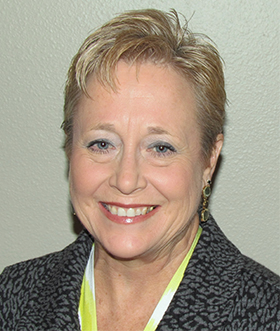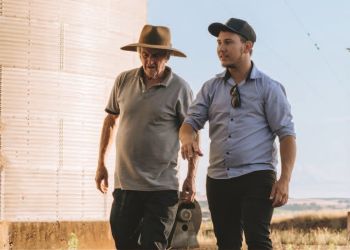 Interview by Taylarr Lopez, Communications Specialist, NACCHO
Interview by Taylarr Lopez, Communications Specialist, NACCHO
NACCHO’s Member Spotlight series features interviews with local health department leaders and staff about their careers in public health. This interview features Muriel DeLaVergne-Brown, RN, MPH, Health and Human Services Director of the Crook County Health Department in Prineville, OR. She is a member of NACCHO’s Global Climate Change Workgroup, the 2017 Winter Leadership Meeting Committee, and the Leadership Development Institute Community of Practice. Below she shares her path in public health and highlights a few of the challenges her health department is addressing.
Tell us about your career path in public health.
I started my career as a school nurse after completing nursing school and wound up teaching health occupations for 12 years. Afterward, I moved into a more traditional public health role for Lane County (OR) as a clinic nurse. I soon received my bachelor’s degree in health education from the University of Oregon and my master’s degree in public health from Oregon Health and Science University. After working for a year in Lane County, I was offered a management position in Douglas County and was there for five and a half years. Later, I moved to Deschutes County in Bend, OR, for eight and a half years. In 2008, I was offered the director position with the Crook County Health Department. I’ve learned that a rural community health department is where I belong.
What are some of the highlights of your career in public health? What makes the work that you do worthwhile?
In every position I have been in, I’ve had the opportunity to meet and work with some amazing people. Working to make a difference in my community is really important to me. I was proud previously to take part in facilitating a focus group with seniors, starting the Public Health Preparedness Program in Deschutes County, and helping my department become one of the smallest Public Health Accreditation Board-accredited health departments in 2014. I have an incredible staff. If I didn’t have such a great staff, working in this position would be much harder. We really pull together as a team to service our community. We also work with other health departments and value learning from each other while encouraging one another to continue moving forward in progressing public health and our respective communities. Yes, achieving accreditation is hard but it’s definitely worth it. In Oregon, we’ve worked hard on the modernization of public health and the new framework. I enjoy mentoring staff and making sure they are the face of public health in the community. It was exciting to serve as the Chair of the Coalition of Local Health Officials during the development of the Modernization of Public Health Law and planning for the future in a new and modern way. I’m always looking to learn from people that I know.
What challenges are you or your health department currently facing?
Funding is always an issue. We’ve had to be really creative here and work with a lot of community partners to be successful. Our biggest challenges in Crook County include continued tobacco issues and how to change the norms. Teen pregnancy prevention is another issue we work hard to address. We just completed a new strategic plan that includes ways to tackle those issues. We have really supportive commissioners as well as a host of new ones so we’re trying to educate them on the role and need for public health and how we work for them in the community. Recently, we invited the two new commissioners to a staff meeting and after each staff member explained their role, the commissioners were amazed at all the work that we do.
What is the biggest change you’ve seen in public health since you’ve started in this field?
I think accreditation has been one of the biggest changes I’ve seen since working in public health—that, along with the healthcare transformation movement and the modernization of public health and focus on the foundation capabilities in Oregon. I currently sit on Oregon’s Public Health Advisory Board and we are discussing serious tactics for aligning and coordinating public health, early learning, coordinated care organizations, hospitals, and other partners for a collective impact on health improvements. Although there are many discussions about health improvements, it’s time we take action to support the work of public health and its role in the system. Health departments have always been community-minded and working with our partners is incredibly important. It’s very critical to our future.
How are you positioning yourself and/or your health department for the future?
I would love to retire in about four years or so but in the meantime I’ve been thinking about how to create an effective succession plan. I’d like for my department to make a seamless transition in leadership and want to leave Crook County Health Department in good hands upon my departure. Also, I think about how I can continue working in public health after I retire—whether that be a contract position or helping another health department, I want to continue to pass on my experiences and teachings to others. I love helping people be successful.
How long have you been a member of NACCHO and what value do you find in belonging?
I have been a member of NACCHO since I began working in Deschutes County. I was very involved in NACCHO’s preparedness activities. In 2013, I was invited to speak at NACCHO Annual on healthcare reform in central Oregon. So far, I’ve recruited three other colleagues to attend NACCHO Annual 2017. Not only NACCHO as a whole, but the annual conference has been invaluable—the friendships, innovative ideas, new ways to improve our health department, and just being around other people who are as passionate about the field as I am is rejuvenating. One thing that’s really important to me is that NACCHO provides a voice for smaller local health departments that are often forgotten.
What do you enjoy doing in your time away from work?
I have a really amazing husband who supports the work that I do. We do a lot of activities like hiking, walking, boating, and gardening. I also really enjoy painting and playing with my Springer Spaniel named Max.








